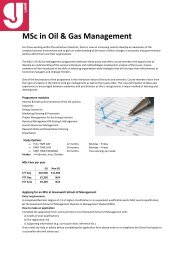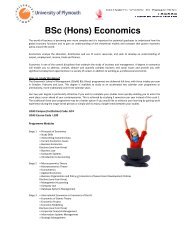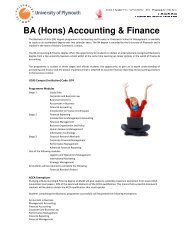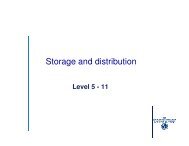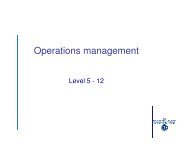(CIPS) Graduate Diploma - Greenwich School of Management
(CIPS) Graduate Diploma - Greenwich School of Management
(CIPS) Graduate Diploma - Greenwich School of Management
You also want an ePaper? Increase the reach of your titles
YUMPU automatically turns print PDFs into web optimized ePapers that Google loves.
The<strong>CIPS</strong><strong>Graduate</strong><br />
<strong>Diploma</strong><br />
chartered institute <strong>of</strong><br />
purchasing & supply<br />
GREENWICH SCHOOL OF MANAGEMENT<br />
LONDON
The<strong>CIPS</strong><strong>Graduate</strong><br />
<strong>Diploma</strong><br />
GREENWICH SCHOOL OF MANAGEMENT<br />
LONDON
Chartered Institute <strong>of</strong> Purchasing and<br />
Supply <strong>Graduate</strong> <strong>Diploma</strong><br />
The Chartered Institute <strong>of</strong> Purchasing and<br />
Supply (<strong>CIPS</strong>) <strong>Graduate</strong> <strong>Diploma</strong> is the lead<br />
qualification for people in the fields <strong>of</strong><br />
purchasing, logistics, transportation, stores and<br />
supply chain activities.<br />
In itself, the qualification is an essential tool in<br />
obtaining senior management jobs in supply<br />
chain management. It also <strong>of</strong>fers significant<br />
career development opportunities in<br />
progressing to MBA and <strong>CIPS</strong> Level 7<br />
programme. Those obtaining the <strong>Diploma</strong> may<br />
be <strong>of</strong>fered direct admission to the University <strong>of</strong><br />
Plymouth MBA programme, delivered at<br />
<strong>Greenwich</strong> <strong>School</strong> <strong>of</strong> <strong>Management</strong>.<br />
Successful completion <strong>of</strong> the programme also<br />
leads to corporate membership <strong>of</strong> the Institute<br />
and the use <strong>of</strong> the designatory letters M<strong>CIPS</strong>.<br />
The Foundation Stage consists <strong>of</strong> five modules.<br />
Programme members are advised to consider<br />
whether they are entitled to exemptions from<br />
certain modules on the programme. These<br />
must be obtained directly from the Institute.<br />
The <strong>Diploma</strong> consists <strong>of</strong> ten modules.<br />
Exemptions are rarely granted from this stage,<br />
evidence <strong>of</strong> degree equivalent study will be<br />
needed.<br />
The modules are all assessed by examination.<br />
There are two examination sessions each year,<br />
with course members taking external<br />
examinations from the Institute. The<br />
examinations will take place during the third<br />
week <strong>of</strong> May and the last week in November<br />
each year. The length <strong>of</strong> each examination is 3<br />
hours. Entry to examinations is made directly<br />
through the Institute. It is a student’s<br />
responsibility to enter exams.<br />
<strong>Greenwich</strong> <strong>School</strong> <strong>of</strong> <strong>Management</strong><br />
The school is one <strong>of</strong> London’s foremost<br />
independent higher education business school<br />
for management studies specialising in<br />
programmes leading to academic qualifications.<br />
Since the <strong>School</strong>’s foundation in 1973, many <strong>of</strong><br />
its successful graduates have started<br />
businesses, continued with their own<br />
businesses, or taken up management positions<br />
in the private and public sectors.<br />
The <strong>School</strong> has links with Universities both in<br />
Britain and around the world and <strong>of</strong>fers<br />
validated programmes <strong>of</strong> such high ranking<br />
institutions as the University <strong>of</strong> Plymouth,<br />
University <strong>of</strong> Wales as well as Northwood<br />
University in the USA.<br />
<strong>Greenwich</strong> <strong>School</strong> <strong>of</strong> <strong>Management</strong> runs a wide<br />
range <strong>of</strong> MBAs, MScs, undergraduate degrees<br />
and pr<strong>of</strong>essional qualifications. Courses are<br />
available on a full and part-time basis and last<br />
between one and four years.<br />
Programme Structure<br />
The programme is divided into two stages, the<br />
Foundation Stage which is HNC/D equivalent<br />
and the Level 5 and 6 which are at the level <strong>of</strong><br />
a bachelors degree.<br />
Entry Dates<br />
There are flexible start dates to the programme.<br />
The Course members can commence the<br />
programme in January, February, March, April,<br />
September, October and November. Each<br />
module will be delivered over two weekends<br />
(Saturday and Sunday). In addition, there is a<br />
revision day (inclusive within the course fee)<br />
prior to the examination. The dates <strong>of</strong> the<br />
module weekends and revision days can be<br />
found in the enclosed module timetable.<br />
Examinations<br />
The Chartered Institute <strong>of</strong> Purchasing and<br />
Supply (<strong>CIPS</strong>) examinations are held in May<br />
and November each year. It is the course<br />
members’ responsibility to register for these<br />
examinations directly with <strong>CIPS</strong>.<br />
<strong>CIPS</strong> Membership<br />
Course members should apply directly to <strong>CIPS</strong><br />
for membership <strong>of</strong> the Institute. The Course<br />
Director will advise course members on<br />
application procedure. The <strong>School</strong> tuition fees<br />
do not include <strong>CIPS</strong> membership fees.
teaching & administrative personnel<br />
Wayne Herring<br />
rubicontraininguk@yahoo.co.uk<br />
Wayne Herring MSc,M<strong>CIPS</strong>, has over twenty years teaching<br />
experience at Southall, Watford, Harlow and Writtle colleges<br />
and was an examiner with Chartered Institute <strong>of</strong> Purchasing<br />
and Supply for five years.<br />
Wayne is the Director <strong>of</strong> Rubicon Training, one <strong>of</strong> the largest<br />
<strong>CIPS</strong> trainers in the UK. He has many years industrial<br />
experience in purchasing and has worked for TI Raleigh in<br />
Nottingham, Providence Capitol in Birmingham and Astron<br />
On Line in Huntingdon. He is Training Consultant to many<br />
organisations including the Office <strong>of</strong> Government Commerce<br />
and Arrow Electronics.<br />
Steve Langford<br />
slangford@americaii.com<br />
Steve Langford, M<strong>CIPS</strong>, has over twenty years experience in the<br />
purchasing/supply chain function and has been teaching <strong>CIPS</strong><br />
graduate diploma for five years at Writtle College, Manchester<br />
and <strong>Greenwich</strong> <strong>School</strong> <strong>of</strong> <strong>Management</strong> in London. Steve’s<br />
background has been in the electronics industry, working for<br />
companies such as BT, Farnell, Arrow Electronics, Raytheon<br />
Systems and latterly America II Electronics.<br />
Maggie Lincoln<br />
maggielincoln@aol.com<br />
Maggie Lincoln has worked as a buyer for many years in a<br />
variety <strong>of</strong> roles including packaging and clothing. Maggie<br />
currently works in aviation. She qualified for M<strong>CIPS</strong> at Writtle<br />
College with Rubicon Training and moved onto lecturing about<br />
three years ago. Maggie taught most <strong>of</strong> the modules on the<br />
<strong>Graduate</strong> <strong>Diploma</strong> and have a brilliant success rate. My private<br />
life is taken up with my very close family, I have three grown<br />
up children and a granddaughter. My partner plays bass in an<br />
Indie Rock Band.<br />
David Chidley<br />
david.chidley@e2v.com<br />
David Chidley has extensive purchasing experience in scientific,<br />
fire-fighting, medical research & space technology industries. His<br />
twenty years purchasing experience in Strategic Buying & Project<br />
<strong>Management</strong> roles are linked closely to cross functional team<br />
decision making. Various Foundation and Pr<strong>of</strong>essional stage<br />
purchasing courses have been managed at <strong>Greenwich</strong> as well as<br />
at Manchester, Writtle campuses. David is a full member <strong>of</strong> <strong>CIPS</strong><br />
who qualified through Rubicon Training with Wayne Herring.
LEVEL 4<br />
<strong>CIPS</strong> FOUNDATION DIPLOMA<br />
EFFECTIVE NEGOTIATION IN PURCHASING<br />
AND SUPPLY<br />
(Compulsory Core Unit)<br />
The unit is designed to provide students with<br />
the ability to apply a variety <strong>of</strong> theories relating<br />
to negotiation in respect <strong>of</strong> preparation,<br />
planning and participating in the negotiation<br />
process.<br />
Students will undertake activities such as cost<br />
and market analysis, using information to<br />
support the planning <strong>of</strong> negotiation with<br />
suppliers to achieve best value. Students also<br />
apply their knowledge <strong>of</strong> various legal<br />
implications affecting negotiations.<br />
Negotiating is <strong>of</strong>ten a finely balanced activity<br />
and involves managing a range <strong>of</strong> complex<br />
relationships, and students should be prepared<br />
to effectively manage those relationships,<br />
avoiding conflict while maintaining the balance<br />
<strong>of</strong> power.<br />
By the end <strong>of</strong> this unit, students should be able<br />
to plan, prepare and undertake effective<br />
negotiations, demonstrating high levels <strong>of</strong><br />
personal effectiveness and achieving best value<br />
within the supply chain.<br />
DEVELOPING CONTRACTS IN<br />
PURCHASING AND SUPPLY<br />
(Compulsory Core Unit)<br />
This unit is designed to help students to gain<br />
an appreciation <strong>of</strong> the complexities <strong>of</strong> both the<br />
legalities and commercial issues <strong>of</strong> contractual<br />
arrangements entered into with external<br />
organisations. The unit provides an<br />
underpinning knowledge <strong>of</strong> the legalities <strong>of</strong> the<br />
formation <strong>of</strong> contracts as well as the key<br />
ingredients <strong>of</strong> any commercial arrangement - a<br />
specification, the contractual terms and key<br />
performance indicators.<br />
Students will be<br />
able to apply a<br />
variety <strong>of</strong> terms<br />
to contracts in<br />
given situations,<br />
and will be<br />
aware <strong>of</strong> the<br />
significance <strong>of</strong> a<br />
range <strong>of</strong><br />
different<br />
contractual<br />
terms that are<br />
typically applied<br />
to a range <strong>of</strong> procurements affecting both direct<br />
and indirect expenditures. The unit also<br />
analyses the processes used for tendering or<br />
for requests for proposals from external<br />
suppliers through to contract award.<br />
MEASURING PURCHASING PERFORMANCE<br />
(Compulsory Core Unit)<br />
This unit is designed to help students to<br />
measure the effectiveness <strong>of</strong> the supply chain<br />
and its contribution towards aiding the<br />
competitiveness and effectiveness <strong>of</strong> the<br />
organisation.<br />
Students taking this unit should be able to<br />
apply a range <strong>of</strong> measurement techniques used<br />
to monitor the performance <strong>of</strong> a variety <strong>of</strong><br />
individual suppliers, how they perform financially<br />
versus target, compliance to<br />
contract/specification, and potential risks that<br />
they may present.<br />
Measurement will take place on three levels,<br />
organisational, functional and individual.<br />
Students should be able to apply a range <strong>of</strong><br />
techniques and provide results that evaluate<br />
supplier performance, and make suggestions<br />
for future improvements.<br />
MANAGING PURCHASING AND SUPPLY<br />
RELATIONSHIPS<br />
(Compulsory Core Unit)<br />
This unit is designed to enable students to<br />
focus on developing and managing effective
elationships, old and new, within the supply<br />
chain.<br />
Students will be able to review and develop<br />
existing relationships and identify opportunities<br />
for establishing new relationships that will<br />
enhance the performance <strong>of</strong> the supply chain,<br />
while exploring the benefits and risks <strong>of</strong><br />
establishing such relationships.<br />
By the end <strong>of</strong> this unit, students should be able<br />
to develop new relationships, manage existing<br />
relationships and exploit opportunities in both,<br />
that will maximise the effectiveness <strong>of</strong> the<br />
supply chain.<br />
PURCHASING CONTEXTS<br />
(Compulsory Core and Integrative Unit)<br />
This unit is designed to consolidate the learning<br />
from all four units in the <strong>CIPS</strong> Foundation<br />
<strong>Diploma</strong>. There will be an assessment .<br />
This unit is designed to enable students to<br />
apply the fundamental principles <strong>of</strong> purchasing<br />
and supply in a variety <strong>of</strong> different contexts,<br />
including a range <strong>of</strong> private sector<br />
organisations, including multi-nationals and<br />
small/medium sized enterprises (SMEs), plus<br />
the public sector; national and local<br />
government; the NHS; and the not-for pr<strong>of</strong>it<br />
sector including charities and the voluntary<br />
sector. Students will be able to consider the<br />
procurement cycle as it applies to a diverse<br />
range to purchased products and services<br />
including raw materials, commodities,<br />
components, utilities and services, both<br />
domestically and in an international context.<br />
This unit will tackle the different challenges<br />
faced by a wide range <strong>of</strong> organisations and<br />
sectors as they strive to achieve best value,<br />
quality, effectiveness and competitiveness<br />
within the broader supply chain.<br />
Successful students will be able to apply sound<br />
principles <strong>of</strong> purchasing and supply management<br />
to a diverse range <strong>of</strong> sectors and organisations<br />
utilising knowledge from across all <strong>of</strong> level 4,<br />
and will be able to employ and develop<br />
transferable best practice where appropriate.<br />
LEVEL 5<br />
<strong>CIPS</strong> ADVANCED DIPLOMA<br />
MANAGEMENT IN THE PURCHASING<br />
FUNCTION<br />
(Compulsory Core Unit)<br />
This unit is designed to enable students to<br />
manage their own area <strong>of</strong> responsibility within<br />
an organisation’s internal supply chain, in line<br />
with the overall strategic business plan and the<br />
operational plan for the purchasing function.<br />
Students should be able to implement<br />
operational plans for their own area <strong>of</strong><br />
responsibility to achieve objectives set out in<br />
their plan. In doing so they should be able to<br />
employ a range <strong>of</strong> resources, including human,<br />
physical and financial, and manage and<br />
delegate tasks effectively.<br />
This unit is about managing the expectations <strong>of</strong><br />
the stakeholders that are directly involved in the<br />
student’s own area <strong>of</strong> responsibility and will<br />
provide them with management techniques to<br />
help them to involve others, be innovative,<br />
consultative, influential and persuasive in order<br />
to achieve targets effectively.<br />
RISK MANAGEMENT AND SUPPLY CHAIN<br />
VULNERABILITY<br />
(Compulsory Core Unit)<br />
This unit is designed to enable students to<br />
undertake risk analysis and a variety <strong>of</strong> risk<br />
assessments relating to different aspects <strong>of</strong><br />
purchasing and supply and to implement a<br />
range <strong>of</strong> appropriate risk management tools<br />
and techniques.<br />
Students will use a variety <strong>of</strong> risk assessment<br />
tools and techniques designed to provide a<br />
detailed analysis <strong>of</strong> supply chain situations,<br />
including legal, corporate social responsibility<br />
(CSR), ethical, health and safety, financial,<br />
international, innovation and a variety <strong>of</strong> other<br />
potential risk scenarios. The scope covers both
the proactive identification and avoidance <strong>of</strong><br />
risk, as well as provision for post-event<br />
recovery initiatives.<br />
By the end <strong>of</strong> the unit students should be able<br />
to apply a variety <strong>of</strong> tools and techniques, in a<br />
diverse range <strong>of</strong> contexts, to proactively<br />
establish the level <strong>of</strong> risk presented and to<br />
recommend ways <strong>of</strong> avoiding, mitigating or<br />
managing those risks.<br />
IMPROVING SUPPLY PERFORMANCE<br />
(Integrative Unit)<br />
This unit is designed to consolidate the learning<br />
from the other two compulsory units in the<br />
<strong>CIPS</strong> Advanced <strong>Diploma</strong>. You will be assessed<br />
through either a case study exam or an<br />
assignment.<br />
Achieving success within the supply chain<br />
involves a complex range <strong>of</strong> variables, which<br />
can frequently be dependent on one another<br />
for the success <strong>of</strong> the supply chain.<br />
This unit is designed to enable students to use<br />
a range <strong>of</strong> techniques and strategies to develop<br />
and improve supplier performance in order to<br />
achieve competitiveness, efficiency and<br />
pr<strong>of</strong>itability within the supply chain.<br />
By the end <strong>of</strong> this unit, students will be able to<br />
measure and evaluate the effectiveness <strong>of</strong><br />
supply chain performance. They will be able to<br />
identify innovative development <strong>of</strong> systems to<br />
improve the performance <strong>of</strong> the supply chain,<br />
and make justifiable recommendations for<br />
implementation in order to aid the effectiveness<br />
<strong>of</strong> the supply chain.<br />
MARKETING FOR PURCHASERS<br />
(Optional Unit)<br />
This unit is designed to provide students with<br />
an appreciation <strong>of</strong> the marketing concept, the<br />
role <strong>of</strong> marketing within an organisation,<br />
marketing’s relationship with purchasing and<br />
supply, and marketing’s contribution to the<br />
overall strategic plan.<br />
Students will be<br />
introduced to<br />
marketing<br />
concepts,<br />
methods and<br />
techniques that<br />
are used to<br />
develop<br />
marketing plans<br />
with the ultimate<br />
aim <strong>of</strong> achieving<br />
customer<br />
satisfaction.<br />
These techniques may be applied to both notfor-pr<strong>of</strong>it<br />
and commercial organisations.<br />
By the end <strong>of</strong> the unit students should be able<br />
to evaluate and apply marketing tools and<br />
techniques, in a range <strong>of</strong> contexts, to achieve<br />
customer satisfaction.<br />
STORAGE AND DISTRIBUTION<br />
(Optional Unit)<br />
This unit is concerned with helping students to<br />
identify the major areas <strong>of</strong> concern in effectively<br />
managing stores and distribution throughout<br />
the supply chain. It is essential that goods are<br />
moved through supply chains to customers at<br />
the right time, in the right condition, at the right<br />
place and at the right cost. Failure in any <strong>of</strong><br />
these areas will add unnecessary costs to the<br />
ultimate customer while success will add value,<br />
and delight the customer.<br />
It is essential that storage, distribution and<br />
general logistics are coordinated, both<br />
upstream and downstream, in order to reduce<br />
lead times, provide agility and reduce<br />
unnecessary costs. In order for this to happen it<br />
is essential that relationships, both internally<br />
and externally, are honed to the appropriate<br />
level.<br />
To be effective, storage and distribution must fit<br />
in a seamless way to the total supply chain<br />
locally, nationally and globally.
OPERATIONS MANAGEMENT IN THE<br />
SUPPLY CHAIN<br />
(Optional Unit)<br />
This unit is designed to enable those who work<br />
in purchasing to assess the efficiency and<br />
effectiveness <strong>of</strong> an organisation’s operations.<br />
This is the process <strong>of</strong> converting input<br />
resources into output products and services<br />
and occurs in all types <strong>of</strong> organisation, whether<br />
in manufacturing or services, public sector or<br />
private.<br />
Students should be able to understand how<br />
operations staff add value to its inputs through<br />
the effective management <strong>of</strong> production and<br />
delivery. Operations staff are likely to be the<br />
most important internal customers <strong>of</strong><br />
purchasing and supply chain managers.<br />
By the end <strong>of</strong> this unit students will be able to<br />
analyse and evaluate an operations<br />
environment and implement a strategic plan<br />
that allocates resources in terms <strong>of</strong> materials,<br />
labour and machinery. In addition they will be<br />
able to consider the infrastructure requirements<br />
<strong>of</strong> the management control systems, as applied<br />
to different process types and technologies,<br />
and select the right approach.<br />
LEVEL 6<br />
<strong>CIPS</strong> GRADUATE DIPLOMA<br />
LEADING AND INFLUENCING IN<br />
PURCHASING<br />
(Compulsory Core Unit)<br />
This unit is designed to develop students’<br />
leadership skills to enable them to lead,<br />
influence and provide direction to stakeholders<br />
within the supply chain.<br />
Students should be able to operate at a<br />
strategic level. They should be able to lead in<br />
their defined area or part <strong>of</strong> the organisation<br />
and will be expected to motivate and support<br />
supply chain members and stakeholders in<br />
achieving objectives and success.<br />
Students will be expected to lead in a variety <strong>of</strong><br />
situations and to ensure that they maintain the<br />
balance <strong>of</strong> power required to achieve success.<br />
They should be able to demonstrate effective<br />
leadership in a variety <strong>of</strong> contexts, including<br />
change, adversity, conflict and success, in<br />
order to maximise the potential <strong>of</strong> the<br />
organisation.<br />
STRATEGIC SUPPLY CHAIN MANAGEMENT<br />
(Compulsory Core Unit)<br />
The supply chain manager is responsible for<br />
specific activities and processes which can<br />
contribute to achieving corporate strategic<br />
goals. This unit is designed to provide students<br />
with an understanding <strong>of</strong> strategic aspects <strong>of</strong><br />
supply chain management. Students will<br />
analyse the supply chain to identify where value<br />
is added within it, identifying where and how<br />
strategic competitive advantage can be<br />
achieved.<br />
Students will be expected to propose a range<br />
<strong>of</strong> innovative proposals which will allow supply<br />
chain stakeholders to effectively interact and<br />
contribute towards developing and exploiting<br />
opportunities to grow and expand the business,<br />
through new product and service development,<br />
<strong>of</strong>fering innovative ideas, diversification and<br />
differentiation strategies.<br />
SUPPLY CHAIN MANAGEMENT IN<br />
PRACTICE<br />
(Integrative Unit)<br />
Work-based Project<br />
Please note that Supply Chain <strong>Management</strong> in<br />
Practice has two separate briefs, one for the<br />
case study option and one for the work-based<br />
project.<br />
This unit is designed to enable students to gain<br />
a deeper understanding <strong>of</strong> supply chain theory<br />
and practice by examining how particular<br />
theories relate to real-world situations or how
particular theories <strong>of</strong>fer advantages over others.<br />
As the unit is project-based and requires the<br />
submission <strong>of</strong> a report, the student will also<br />
develop investigative, analytical and<br />
communication skills.<br />
Where students are likely to undertake a workbased<br />
project this can take two alternative<br />
forms: either (i) it will seek to test the<br />
explanatory power <strong>of</strong> an existing body <strong>of</strong><br />
theoretical knowledge against a case example;<br />
or (ii) it will seek to test the explanatory power<br />
<strong>of</strong> an existing body <strong>of</strong> theoretical knowledge to<br />
make predictions about the likely outcome <strong>of</strong><br />
an impending test case.<br />
If it is not possible to undertake a work-based<br />
project, then students can opt for a deskbased<br />
version. Again, there are two alternative<br />
formats: either (i) it will critique an existing<br />
theory in order to develop a better explanation<br />
<strong>of</strong> a set <strong>of</strong> phenomena; or (ii) it will critique a set<br />
<strong>of</strong> competing theories in order to say which has<br />
the greater explanatory power.<br />
It is important to remember that the project is<br />
driven by theory. Students must identify a<br />
theory or set <strong>of</strong> theories by referring to the<br />
learning outcomes <strong>of</strong> the other two Level 6<br />
units: Leading and Influencing in Purchasing<br />
and Strategic Supply Chain <strong>Management</strong>.<br />
SUPPLY CHAIN MANAGEMENT IN<br />
PRACTICE<br />
(Integrative Unit)<br />
Case Study Option<br />
Please note that Supply Chain <strong>Management</strong> in<br />
Practice has two separate briefs, one for the<br />
case study option and one for the work-based<br />
project.<br />
This unit is designed to give candidates an<br />
examination based alternative to the workbased<br />
project unit. The case study approach<br />
facilitates hands-on experience <strong>of</strong> complex<br />
supply chain issues by replicating real-life<br />
situations in a controlled environment. It will<br />
enable candidates to gain a wider<br />
understanding <strong>of</strong> supply chain issues by<br />
examining how<br />
a range <strong>of</strong><br />
concepts and<br />
principles can<br />
be applied to<br />
real-world<br />
problems and<br />
situations in<br />
order to improve<br />
best practice.<br />
The unit<br />
consists <strong>of</strong> a<br />
substantive case study which corresponds as<br />
closely as possible to one which might be met<br />
in real life. It is designed to test the ability <strong>of</strong> the<br />
candidate to analyse supply chain situations<br />
and to write clearly and effectively on them. The<br />
case study is circulated prior to the<br />
examination, which enables candidates to<br />
analyse the case study situation, conduct<br />
supplementary investigations and prepare<br />
appropriate solutions in advance. Assessment<br />
is by means <strong>of</strong> a three-hour, open-book<br />
examination with unseen questions.<br />
LEGAL ASPECTS IN PURCHASING AND<br />
SUPPLY<br />
(Optional Unit)<br />
This unit seeks to familiarise students with the<br />
law that regulates the purchasing function.<br />
The P&SM needs to understand where legal<br />
issues may impact on the organisation and<br />
when to take action to avoid risk. They should<br />
also be able to recognise situations when the<br />
appropriate action would be to seek legal<br />
expertise.<br />
The content provides an essential overview <strong>of</strong><br />
different legal issues with particular emphasis<br />
on contractual issues and sale <strong>of</strong> goods<br />
legislation. Other areas covered include the<br />
legal aspects <strong>of</strong> outsourcing, competition law,<br />
intellectual property law, electronic trading and<br />
international trade. It is designed to assist<br />
pr<strong>of</strong>essionals who work in either the public or<br />
private sector.
ADVANCED PROJECT MANAGEMENT<br />
(Optional Unit)<br />
Projects can range from construction to<br />
refurbishment <strong>of</strong> premises, introduction <strong>of</strong> new<br />
information technology systems to<br />
outsourcing/<strong>of</strong>f shoring <strong>of</strong> work previously<br />
tackled in-house, and re-design or reengineering<br />
<strong>of</strong> products, services and<br />
processes. At the same time projects should<br />
align and contribute to the overall strategic<br />
objectives <strong>of</strong> the organisation.<br />
This unit will help students to develop<br />
knowledge <strong>of</strong> the principles, practices and<br />
techniques vital to the leadership and<br />
commercial management <strong>of</strong> projects, with a<br />
particular emphasis on the role <strong>of</strong> the<br />
purchasing and supply chain pr<strong>of</strong>essional.<br />
Supply chain specialists in both the private and<br />
public sectors should have a pivotal role in the<br />
initiation, planning and control <strong>of</strong> projects, and<br />
in the development and ongoing management<br />
<strong>of</strong> resulting contracts, serving suppliers and<br />
customers alike.<br />
Project management is concerned with<br />
achieving objectives relating to quality, cost and<br />
time. Supply chain specialists have a high<br />
degree <strong>of</strong> involvement in developing the<br />
procurement strategy for contracts with<br />
suppliers, and with the operational activities <strong>of</strong><br />
monitoring and administering supplier<br />
performance.<br />
Students need to understand the architecture<br />
<strong>of</strong> project orientated organisations. The focus is<br />
subsequently directed towards roles such as<br />
project leader, project-team members, projectcoordinator/coach<br />
and project-mentor, from the<br />
project management point <strong>of</strong> view.<br />
finance in relation to the decision-making<br />
process and detailed analysis necessary to<br />
deliver effective procurement.<br />
Students will understand how to navigate<br />
around the world <strong>of</strong> finance in an effective and<br />
efficient manner so they can identify the where,<br />
when, how, and what a pr<strong>of</strong>essional purchaser<br />
needs, in order to use and interpret the key<br />
financial models and tools required to deliver<br />
robust and sustainable procurement solutions.<br />
Students will be expected to propose a range<br />
<strong>of</strong> tried and tested models, as well as<br />
innovative tools and techniques, which will<br />
allow key business stakeholders to interact and<br />
contribute towards developing and exploiting<br />
opportunities to grow and expand a business,<br />
through new supply arrangements, channels to<br />
market, diversification, outsourcing and<br />
differentiation strategies.<br />
It will help students to develop an<br />
understanding <strong>of</strong> the terminology and different<br />
sectors within the financial and accounting<br />
pr<strong>of</strong>ession which allows an engagement and<br />
exchange that will guide and benefit the<br />
decision-making process in an efficient manner.<br />
FINANCE FOR PURCHASERS<br />
(Optional Unit)<br />
Purchasing managers are responsible for<br />
specific activities and processes, which can<br />
contribute to achieving corporate strategic<br />
goals. This unit is designed to provide students<br />
with an understanding <strong>of</strong> strategic aspects <strong>of</strong>
GREENWICH SCHOOL OF MANAGEMENT<br />
LONDON
The<strong>CIPS</strong><strong>Graduate</strong><br />
<strong>Diploma</strong><br />
fees information<br />
£2,500 Foundation <strong>Diploma</strong>/Level 4<br />
(includes five modules)<br />
£2,500 Advanced <strong>Diploma</strong>/Level 5<br />
(includes five modules)<br />
£2,500 <strong>Graduate</strong> <strong>Diploma</strong>/Level 6<br />
(includes five modules)<br />
The above prices include study texts.<br />
Fees are payable to <strong>Greenwich</strong> College Ltd<br />
Examination Fees payable directly to <strong>CIPS</strong><br />
Annual membership payable directly to <strong>CIPS</strong><br />
Tuition Fees are payable on enrolment
application form<br />
The<strong>CIPS</strong><strong>Graduate</strong><br />
<strong>Diploma</strong><br />
Title Mr Mrs Ms Dr<br />
Family Name<br />
First name(s)<br />
Date <strong>of</strong> birth<br />
Address<br />
Tel<br />
E-mail<br />
Level <strong>of</strong> Study Level 4 Level 5 Level 6 Other<br />
Please attach your CV, work reference, copies <strong>of</strong> relevant qualifications and return to:<br />
Tamara Solomun, <strong>CIPS</strong> Programmes Director, <strong>Greenwich</strong> <strong>School</strong> <strong>of</strong> <strong>Management</strong>,<br />
Meridian House, Royal Hill, <strong>Greenwich</strong>, London SE10 8RD.<br />
t: +44 (0)20 8516 7800 f: +44 (0)20 8516 7801<br />
cips@greenwich-college.ac.uk www.greenwich-college.ac.uk<br />
I wish to apply for a place on the <strong>Greenwich</strong> <strong>School</strong> <strong>of</strong> <strong>Management</strong> Chartered Institute <strong>of</strong><br />
Purchasing and Supply (<strong>CIPS</strong>) <strong>Graduate</strong> <strong>Diploma</strong> commencing in:<br />
January February March April September October November<br />
(Please tick preferred month)<br />
Signed<br />
Date<br />
terms and conditions<br />
Programme details are correct at the time <strong>of</strong> going to press but are subject to alteration.<br />
Programme members must adhere to the <strong>Greenwich</strong> <strong>School</strong> <strong>of</strong> <strong>Management</strong> and the Chartered<br />
Institute <strong>of</strong> Purchasing and Supply regulations relating to their programme, copies <strong>of</strong> which will be<br />
provided on enrolment.<br />
Original transcripts, diplomas, certificates and degrees listed in your CV must be produced for the<br />
Registrar’s scrutiny if required.
GREENWICH SCHOOL OF MANAGEMENT<br />
LONDON<br />
<strong>Greenwich</strong> <strong>School</strong> <strong>of</strong> <strong>Management</strong><br />
Meridian House • Royal Hill • <strong>Greenwich</strong><br />
London • SE10 8RD<br />
tel +44 (0)20 8516 7800<br />
fax +44 (0)20 8516 7801<br />
email cips@greenwich-college.ac.uk<br />
web www.greenwich-college.ac.uk



